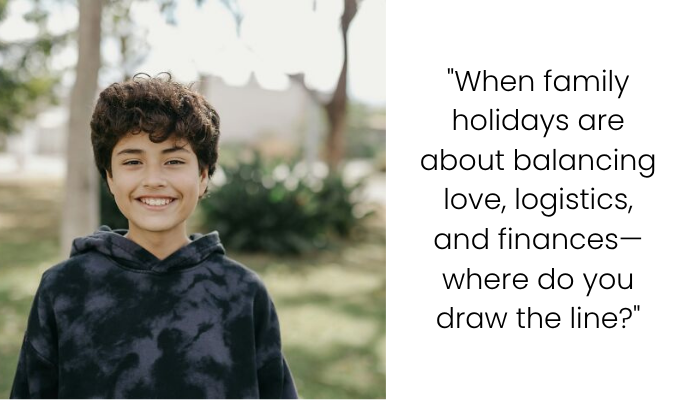A Family Dilemma: Should We Go on Holiday Without Our Son?

In this AITA-style post, Suncloudstars presents a heartfelt dilemma that tugs at both financial practicality and maternal guilt. She’s a mother of three—one son (DS, 14) from a previous relationship, and two daughters (DDs, 9 and 4) with her current partner (DP). The entire blended family had already enjoyed a lavish, long-haul Easter vacation together, which was deemed the primary holiday of the year. Now, with summer break underway and budget constraints in play, she’s considering a more modest, last-minute getaway—but only for herself, her partner, and the two daughters. The caveat? DS would be staying with his father that same week, and although there were tentative plans for his dad to take him on a trip, those plans remain uncertain.
The crux of the issue is emotional rather than logistical. From a scheduling standpoint, the plan appears sensible—DS would be with his father, and she’d be using that window for a trip that would otherwise be unaffordable if he were included. However, she grapples with a sense of guilt over excluding her son from the family experience, even if circumstances and financial limits justify the decision. The poster asks if it’s reasonable to go ahead with the trip or whether doing so would be unfair or emotionally harmful to her son.
Advertisement – Continue Reading Below
For parents navigating blended families and shared custody, even planning a simple getaway can stir up complicated emotions and tough decisions

Advertisement – Continue Reading Below
The author has a teenage son from a previous relationship and two daughters with her current partner, and they recently got back from a long, expensive holiday

Advertisement – Continue Reading Below

Advertisement – Continue Reading Below

Advertisement – Continue Reading Below

Advertisement – Continue Reading Below

Advertisement – Continue Reading Below

Advertisement – Continue Reading Below

Advertisement – Continue Reading Below

Advertisement – Continue Reading Below
Emotional Fairness vs. Practical Reality: Navigating Family Holidays in a Blended Family
The scenario at hand involves not just a family planning a vacation but also a mother dealing with complex emotional and financial decisions within the framework of a blended family. In this case, Suncloudstars is torn between giving her daughters a vacation they can afford and navigating the delicate balance of family dynamics with her son from a previous relationship. The challenge lies not in the logistics of the trip—since DS (the teenage son) will be with his dad—but in the emotional impact this decision could have on him. The mother’s dilemma speaks to a larger issue in blended families: how to navigate shared custody, fairness, and the emotions of children when financial and time constraints limit family experiences.

Advertisement – Continue Reading Below
Understanding Custodial Dynamics and Legal Responsibility
Legally speaking, in shared custody arrangements, there is no explicit requirement for one parent to ensure equal holidays or experiences between siblings, especially if the child in question is spending time with the other parent during the period in question. In the context of family law, both parents are entitled to use their custodial time as they see fit, meaning that the mother in this situation is not obligated to include her son in this particular trip. Custodial laws generally encourage independent holiday plans during each parent’s time with the child, ensuring that one parent is not responsible for the other’s holiday arrangements (see B. v. B. (Child Custody: Parental Discretion) [2012] UKFC). Therefore, while the mother may feel guilty, she is not legally required to alter her plans just to ensure that her son is included.
Child Development Insights: Emotional Impact of Exclusion
From a psychological standpoint, however, the impact of exclusion cannot be ignored. Adolescents, particularly those in blended families, are often sensitive to feelings of being left out or “othered” by family decisions. Research from the American Academy of Pediatrics suggests that teenagers are highly aware of familial dynamics and can experience feelings of neglect if they perceive that their presence is not valued or considered during significant events. This can be exacerbated in situations where siblings are included but one child is left behind. It’s critical that the mother address these concerns early on and explain the situation transparently to her son.
Despite this, there’s also research that emphasizes the importance of open communication. According to Dr. Kenneth Ginsburg, a leading expert in adolescent medicine, children are more likely to feel secure and valued when they have open conversations about family plans. For example, discussing the financial realities of the situation, offering to plan a special event or trip with DS in the future, or simply ensuring that he feels emotionally supported can go a long way in alleviating feelings of exclusion. Moreover, when children understand that the decision was made based on financial constraints rather than personal preference, they are less likely to internalize it as a form of favoritism.
Blended Family Dynamics and Shared Parenting: A Delicate Balance
The issue also highlights the unique challenges of parenting in a blended family, where each parent brings different expectations, traditions, and financial realities. In this case, the father’s potential trip with DS remains uncertain, which only adds to the confusion. Ideally, both parents would coordinate holidays and activities to ensure that their children feel equally loved and included. However, in practice, this is often not possible due to logistical issues, financial constraints, or differing parenting styles.

Advertisement – Continue Reading Below
Online parenting communities, particularly in the AIBU subreddits, show a divide in opinions on whether it’s acceptable for a mother to go on holiday without her son. Some argue that if the father is taking the child on a trip or planning something special during his custodial week, the mother should feel no guilt about enjoying a break with her daughters. Others suggest that, where possible, the family should attempt to find ways to include every child in shared activities. In either case, the consensus often leans toward the importance of communication, ensuring that no child feels excluded or less loved due to financial or scheduling decisions.
Advertisement – Continue Reading Below
Balancing Practicality with Emotional Needs
Ultimately, this family’s decision is a balancing act between the practical need to manage finances and the emotional realities of family life. While the mother is justified in wanting to take a break with her daughters, especially after already investing in a large holiday earlier in the year, the challenge is managing the emotional well-being of her son. The decision is not inherently unfair or unreasonable, but the key to making it work lies in ensuring that the son’s emotional needs are addressed. A well-timed conversation, understanding of his feelings, and perhaps planning for future family time can help mitigate any negative impacts.
Netizens didn’t side with the author on this one, as they accused her of trying to exclude the son from the trip

Advertisement – Continue Reading Below

Advertisement – Continue Reading Below

Advertisement – Continue Reading Below

Advertisement – Continue Reading Below

Advertisement – Continue Reading Below






